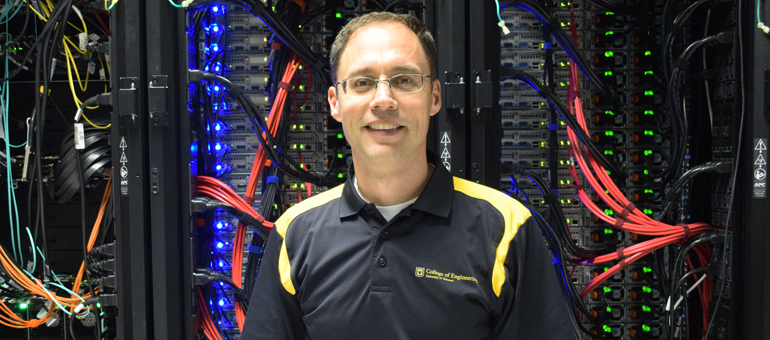Many colleges and universities across the Midwest need comprehensive assistance with building or improving their cyberinfrastructure, but may not know exactly what they need or where to start.
A team of seven experts from universities across the region — led by Mizzou Engineering’s Timothy Middelkoop — recently received $1.4 million from the National Science Foundation to both meet this need and provide workforce development to fill an emerging need in high-performance research computing.
The team is called the Great Plains Regional CyberTeam (NSF award number 1925681) and is made up of experts from several states who have a wealth of knowledge in the aspects that go into research computing, including hardware, software, computing architecture, cybersecurity and more. Middelkoop is an assistant teaching professor of Industrial and Manufacturing Systems Engineering and director of Research Computing Support Services for the MU Division of Information Technology, and he serves as the project’s principle investigator. He’s joined on the CyberTeam by:
- Daniel Andresen, Kansas State University
- James Deaton, Great Plains Network
- Douglas M. Jennewein, University of South Dakota
- David Swanson, University of Nebraska-Lincoln
- Kevin Brandt, South Dakota State University
- George R. Louthan IV, University of Oklahoma
“The drive behind it is there’s a critical need for building cyberinfrastructure across the nation, and the region, as well,” Middelkoop said. “There are a lot of small colleges that are underresourced and have a lot of personnel turnover.”
Many of these universities would benefit from greater high-performance computing (HPC) power to aid research across campus and to serve any additional HPC needs they may have. This program would pair a mentor from the CyberTeam with a mentee at a college or university partner. They would work together to determine the institution’s needs and walk through the process together from conception to implementation.
“Say they need storage, we will go in and work with the researcher to figure out the types of storage, their needs, how they’ll interact with it, their budget, security and design parameters, as well as the hardware itself,” Middelkoop said. “We’ll work with the vendors to come up with a technical solution, physically install it, go through the installation and build process with them together and provide ongoing support.”
While helping institutions meet their computing needs, the CyberTeam will also work with students to help train them on how to meet the needs of the nascent field of research computing. With so much scientific discovery requiring high-performance computing resources to do modeling, crunch data, store results and more, the field needs well-trained personnel who can help bridge the gap between researchers and their computing needs. It requires someone who can combine research skills and IT support, among other attributes.
“Research computing is not entirely on the faculty or staff side,” Middelkoop explained. “Research computing is the middle where you’re helping facilitate research, co-discovering, working with researchers and learning with them what are the best practice approaches.
“This entirely new career path is partly research, partly academic, partly support. It’s our job as cyberinfrastructure professionals to facilitate research, to serve the researchers, but we also work with them in a team manner.”
